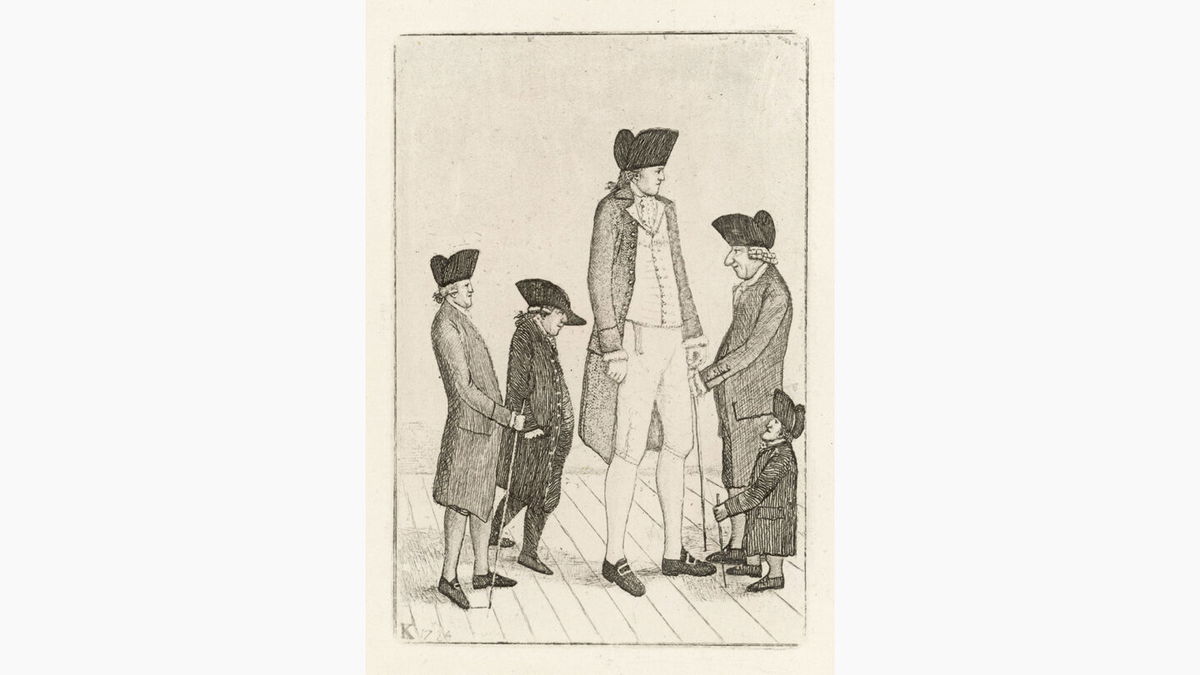Skeleton of man who dreaded becoming a museum exhibit will finally be removed from display

Charles Byrne grew to be 7 feet
Lianne Kolirin, CNN
A British museum is to remove its most famous exhibit from display — the skeleton of an 18th-century man popularly known as the “Irish Giant.”
The Hunterian Museum houses a collection of anatomical specimens at London’s Royal College of Surgeons of England (RCS). It has been closed for five years for a major renovation, but when it reopens in March, its collection of 3,000 objects and specimens on display will not include the skeleton of Charles Byrne.
Byrne had an undiagnosed benign tumor of the pituitary gland. As a result, his body produced too much growth hormone, causing conditions known as acromegaly and gigantism — meaning his bones grew much bigger than normal. He grew to be 7 feet, 7 inches tall.
In the latter stage of his life, Byrne made a living by exhibiting himself as the “Irish Giant.” He died in 1783, and the RCS said it was well documented that he wanted to be buried at sea, to prevent his body being seized by anatomists.
However, the museum’s founder, surgeon and anatomist John Hunter, paid friends of Byrne to hand over his body, and three years later he put the skeleton on show in his museum, then situated in London’s Leicester Square. Byrne’s leg bones feature in the background of a painting of Hunter by famed portraitist Joshua Reynolds.
The portrait will now go on display in the newly renovated museum for the first time in more than 200 years, in place of the skeleton.
A press statement from the RCS confirmed the decision to remove Byrne’s skeleton from the collection, which also features surgical instruments, models and archive materials that trace the history of surgery from ancient times to the latest robot-assisted operations.
It said: “During the period of closure of the Museum, the Board of Trustees of the Hunterian Collection discussed the sensitivities and the differing views surrounding the display and retention of Charles Byrne’s skeleton. The Trustees agreed that Charles Byrne’s skeleton will not be displayed in the redeveloped Hunterian Museum but will still be available for bona fide medical research into the condition of pituitary acromegaly and gigantism.”
Back in 2011, ethicist Len Doyal and lawyer Thomas Muinzer published a paper on the subject in the British Medical Journal, in which they argued for the removal of Byrne’s skeleton from the museum.
They wrote: “Byrne was gripped with fear of Hunter, who used grave robbers (‘resurrectionists’) to provide him with unauthorised exhumed bodies. Because of Hunter’s reputation for collecting unusual specimens for his private museum, Byrne was concerned that Hunter wanted his body for dissection (a fate reserved for executed criminals) and probable display.”
They continued: “Byrne told friends that when he died his body should be sealed in a lead coffin and buried at sea. When Hunter found out he managed to bribe one of them and when the friends stopped overnight on their way to bury Byrne in the English Channel, his body was replaced with heavy objects. Hunter thus acquired the body.”
In a more detailed statement released by the museum, the trustees said of their decision: “John Hunter (1728-1793) and other anatomists and surgeons of the 18th and 19th centuries acquired many specimens in ways we would not consider ethical today and which are rightly subject to review and discussion.”
A new program called Hunterian Provocations will begin this fall to promote new research and explore issues around the display of human remains and the acquisition of specimens during British colonial expansion, the RCS added.
The-CNN-Wire
™ & © 2023 Cable News Network, Inc., a Warner Bros. Discovery Company. All rights reserved.
